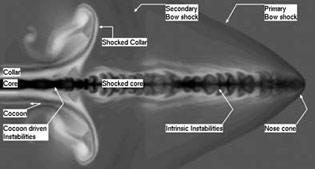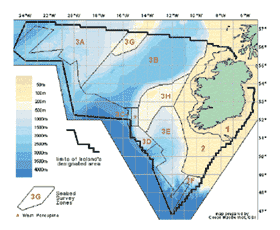| 2005 |

|
YEAR BOOK |
National University of Ireland, Galway
|
The Irish Centre for High-End Computing –
Lár-Ionad DianRíomhaireacht na h-Éireann
|
In January 2005 SFI established, through a grant to NUI, Galway, the Irish Centre for High-End Computing (ICHEC) to service the supercomputing needs of Irish researchers. The intention is to provide a computing facility which is of an order of magnitude greater than currently available. Consequently, more complex problems and new problems can be investigated. When it is fully operational the Centre will address the computational shortfall in high-performance computing through the purchase of a large compute cluster, a symmetrical multiprocessor system (SMP) and a large disk farm. ICHEC will also employ staff to run the systems and to ensure that Irish researchers and groups are in a position to get the most from them. The Centre's funding has come from an initial SFI grant of €2.6m which has been enhanced through a collaboration with two PRTLI projects – the DIAS led CosmoGrid consortium ( www.cosmogrid.org ) and TCD's IITAC programme.


Ireland's current HEC capacity is poor on a European basis having a total peak capacity of around 800 Gflops. This is less than the smallest machine in the list of top 500 supercomputers – www.top500.org , which has in excess of 1,000 Gflops. Furthermore, this capability has been developed in an ad hoc manner with individual researchers/ groups buying clusters to satisfy their short term research goals. On an international basis Ireland's capacity is significantly less than that of some individual universities – over 30 universities appear in the Top 500 Supercomputers list – each has a capacity greater than Ireland's total HEC capability.

To work effectively, ICHEC must be accessible to Irish researchers; consequently ICHEC will be a distributed centre with centre staff located where they are needed – in the universities and research institutes. ICHEC will establish points of presence in each participating institution over the next two years. ICHEC's support staff will be experts in fields ranging from computational fluid dynamics, finite element analysis and molecular modelling, to data mining and bio-informatics. ICHEC systems staff are experts in the running and configuring of large systems. As such, they will be able to enhance Irish computational science to match recent developments in experimental science. ICHEC's success will be measured by the support we give to existing Irish research programmes and in the new science and engineering that the Centre fosters.
As a distributed national centre we can lever economies of scale for hardware and provide a career structure for support and system scientists. Providing such a career structure will be an integral part of ICHEC as it addresses current problems with staff retention and skills' development. An important output of the Centre's activities will be to embed advanced computing methodology into Irish research and, through spin-off and collaboration, to transfer advanced computing technology and expertise to the Irish economy. As such, the Centre will be a synergy of scientific, engineering and computing skills with advanced hardware – involving large-scale processor, disk and visualisation engines.
Contact: Dr Andy Shearer, Director,
ICHEC, NUI, Galway, Galway;
E-mail: [email protected] Web: www.hec.ie